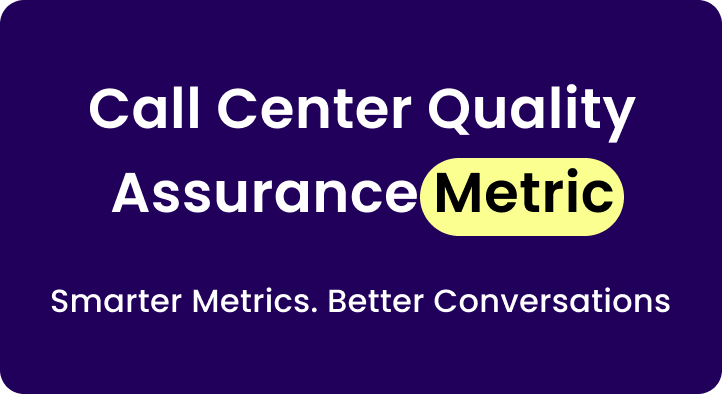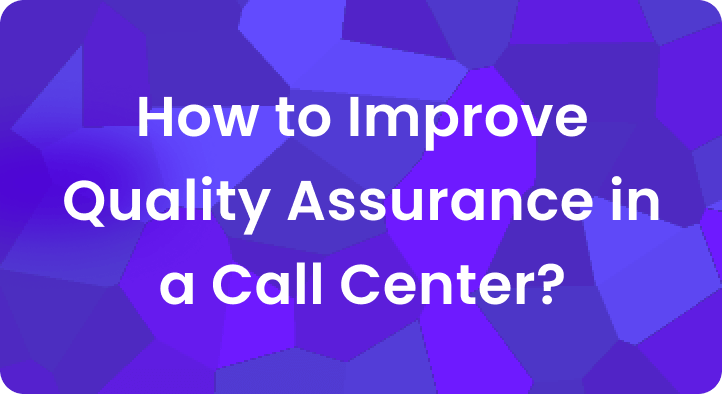You’ve been there.
You sit down with an agent for a coaching session. You cover the call, share some feedback, maybe set a goal or two.
A week later? Same issues. Nothing sticks.
You’re not alone. Over 60% of contact center managers say their coaching doesn’t drive the results they want.
And yet, the right kind of coaching can lift agent engagement, boost CSAT, and even cut attrition.
The problem isn’t effort – it’s how the session’s being run.
Great coaching isn’t just about catching mistakes. It’s about creating a space where agents feel supported, challenged, and clear on how to get better.
This guide breaks it down. You’ll get:
- A simple explanation of what a coaching session should be
- The must-have elements of effective 1:1s
- A clear step-by-step to plan better sessions
- 21 conversation-starting questions to lead like a pro
If you want your sessions to actually improve performance, let’s dig in.
Upload Call & Get Insights
 DOWNLOAD DUMMY FILE
DOWNLOAD DUMMY FILE A. What is a coaching session?
A coaching session is a focused, one-on-one conversation between a team leader and an agent – with the goal of improving performance, building confidence, and reinforcing what “great” looks like on the job.
It’s not a performance review. It’s not a vent session.
And it’s definitely not just “talking about the last call.”
Done right, coaching is about helping agents connect the dots:
- What they did well
- What could be better
- And how to improve – step by step
These sessions should feel supportive, not punitive.
You’re not just pointing out what’s wrong. You’re guiding agents toward consistent, repeatable wins.
Coaching vs. Feedback vs. Training
Let’s clear up the common mix-up:Term Purpose When to Use Feedback Quick, in-the-moment response After a call or live behavior Training Teach new skills or knowledge Onboarding or process updates Coaching Reinforce behaviors, correct course Regular 1:1s or after call reviews
If you want long-term improvement, coaching is where the real magic happens.
B. Key elements of effective training and coaching sessions
If your coaching feels hit-or-miss, you’re not alone. The missing link is usually structured.
Great coaching isn’t about checking QA scores and giving generic feedback. It’s about building repeatable habits – one behavior, one call, one session at a time.
Here are the core elements that make coaching and training sessions actually work in a high-pressure, metric-driven environment:
1. A clear purpose behind every session
Don’t start a session just because “it’s time.” Know exactly why you’re sitting down with the agent.
That could be:
- Reinforcing strong performance (“Let’s unpack what went right on this call”)
- Addressing a specific issue (“Let’s look at that call where the customer asked to speak to a manager”)
- Coaching toward a goal (“You’ve been close to hitting your QA targets — let’s bridge that last 10%”)
Why this matters: When the session has a defined goal, it keeps both of you focused. It also helps the agent feel like the coaching is tailored – not generic.
2. Real data to anchor the conversation
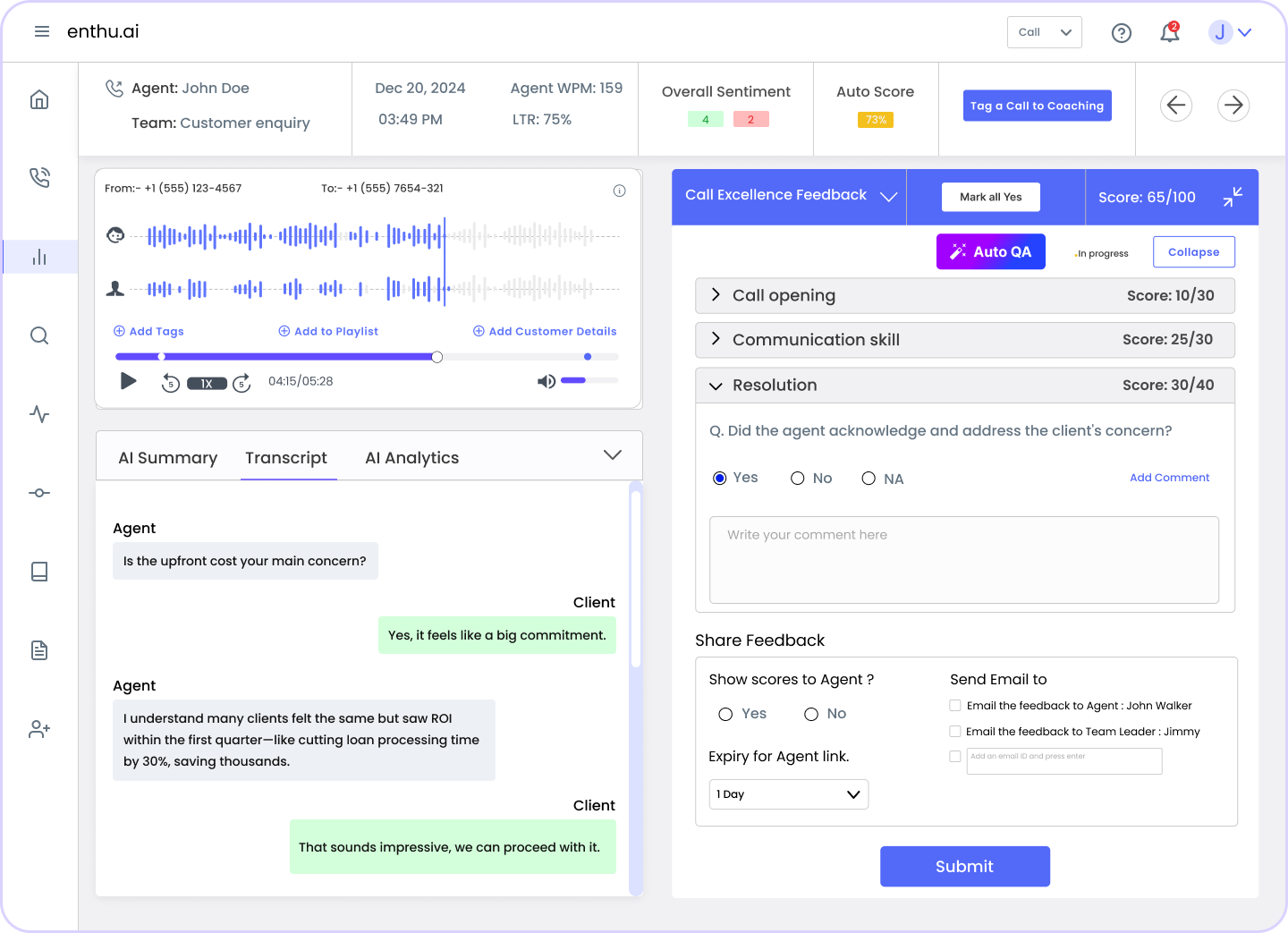
Feedback hits harder when it’s tied to something real, not a vague impression.
Bring data like:
- Call recordings or transcripts
- QA scores and scorecard breakdowns
- CSAT or NPS results tied to specific calls
- Call handle time trends, hold time issues, or silence gaps
Pro tip: Don’t drown them in numbers. Pick one or two examples that tell a clear story.
Why this matters: Agents are more likely to take coaching seriously when they can hear it, see it, and connect the dots themselves.
3. A two-way conversation, not a monologue
Too many coaching sessions feel like a one-way download. But coaching should be collaborative.
Make space for the agent to:
- Reflect on their own performance
- Share what felt difficult or confusing
- Offer ideas for how they want to improve
Try asking:
- “How did you feel that call went?”
- “What would you do differently next time?”
- “What part of this is the hardest for you right now?”
Why this matters: When agents participate, they’re more likely to own the outcome. You’re guiding them to grow, not just handing down orders.
4. Actionable, specific takeaways
Vague goals like “communicate better” or “be more confident” don’t stick.
Instead, end each session with 1–2 clear, behavioral actions.
Example:
- “Use the customer’s name at least once before resolution.”
- “If a customer interrupts, pause for 1 second before replying.”
- “Handle the closing script without reading it word-for-word.”
Even better? Write it down, and follow up in the next session.
Why this matters: Clarity drives consistency. Specific next steps give agents something they can actually practice and apply on the next call.
5. A Consistent Coaching Cadence
Coaching once a month doesn’t move the needle. And micromanaging daily burns everyone out.
Find a rhythm that works – and stick to it. Most high-performing call centers aim for:
- Biweekly 1:1s for active coaching
- Quick weekly huddles to reinforce progress
- Monthly deep dives for skill building or behavioral coaching
Why this matters: Coaching isn’t a one-time fix. It’s a habit, for you and for your agents.
C. How to plan a coaching session: step-by-step guideline
A great coaching session starts before you ever sit down with the agent.
If you want coaching to drive performance – not just check a box, you need to prep with intention.
That means choosing the right focus, bringing the right data, and creating a space where growth actually happens.
Here’s a full step-by-step plan to help you do just that:
Step 1: Identify the “why” behind the session
Before anything else, ask yourself:
Why am I coaching this agent right now?
What behavior or result do I want to change?
Is this a one-time issue or a pattern?
Common triggers:
- A low QA score on a recent call
- A drop in CSAT or First Call Resolution (FCR)
- A call escalation that could’ve been avoided
- Repeated issues with tone, empathy, or listening
Pro tip: Focus on one specific area that’s coachable and relevant to recent performance.
Don’t try to tackle everything in one go – it overwhelms the agent and waters down the message.
Step 2: Review relevant data and call examples
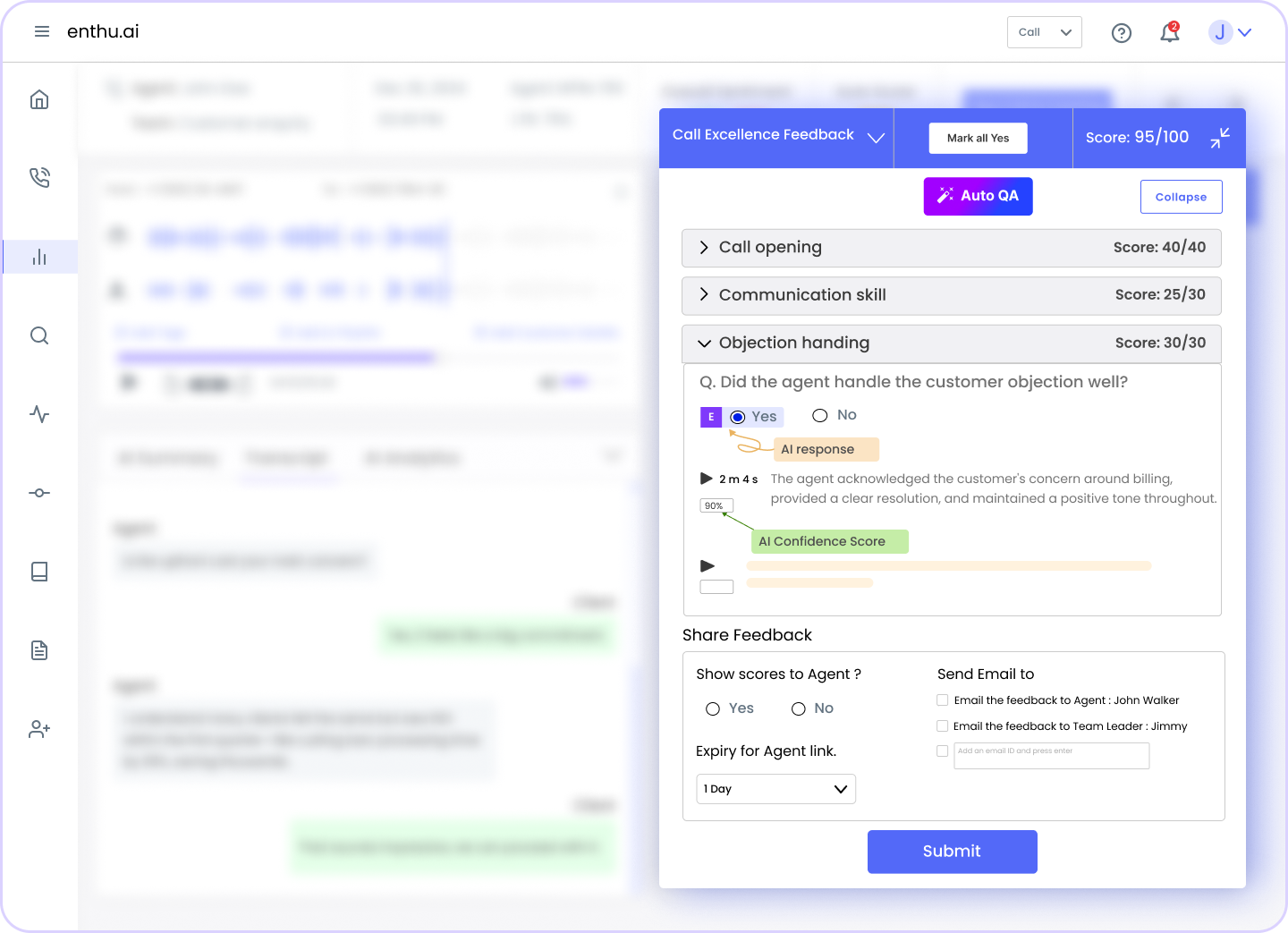
Come prepared. Coaching works best when it’s grounded in real performance, not vague feedback.
What to bring:
- 1–2 call recordings or transcripts – good or bad
- Recent QA evaluations – especially any outliers
- CSAT/NPS comments – what did customers say?
- Productivity trends – like rising AHT or missed after-call work
How to prep it:
- Listen to the full call before the session
- Jot down time stamps of teachable moments
- Compare the agent’s behavior to your QA rubrics or SOPs
Why this matters: Agents are more receptive when you show, not just tell, what went well or needs improvement.
Step 3: Define a clear outcome
Once you know the focus, decide what “success” looks like after the session.
Good coaching outcomes sound like:
- “Reduce dead air on calls by pausing with a purpose.”
- “Handle the objection flow confidently without skipping steps.”
- “Use the empathy statement in the first 30 seconds of the call.”
Make it SMART-ish:
- Specific: Clear behavior tied to the role
- Measurable: You can track it through QA or call reviews
- Realistic: It can be improved within 1–2 weeks
Pro tip: Create a mini checklist the agent can use post-session to self-monitor progress.
Step 4: Write down 3 – 5 coaching questions
Don’t just wing it – have a game plan for how you’ll guide the conversation.
Effective coaching questions:
- “Walk me through what you were thinking during this part of the call.”
- “What would you have done differently with this customer?”
- “How confident do you feel handling [X] type of situation?”
- “What’s the hardest part of the script for you right now?”
These help the agent reflect, self-correct, and buy into the coaching – instead of just being told what to fix.
Step 5: Schedule the session intentionally
Avoid squeezing in coaching between back-to-back calls or when the floor is on fire.
Ideal setup:
- Quiet, private space – no floor noise or interruptions
- Booked in advance – even 15–30 minutes of notice helps
- Right length of time for the depth of conversation
Time guide:
- 10 – 15 minutes: Quick review of one behavior or a high/low call
- 20 – 30 minutes: Pattern coaching or skill-building
- 45+ minutes: Development plans, escalated issues, or multiple topics
Agents need to know coaching isn’t a punishment or a pop quiz. It’s support.
Step 6: Prepare resources and tools
Before the session:
- Load up the call recordings
- Open the QA scorecard and call audit
- Have your coaching tracker or shared notes ready
- Pull up relevant SOPs or scripts if needed
Optional:
Bring printed notes for the agent
Include coaching cards or frameworks for roleplay if you’re working on objection handling or empathy
Why this matters: The more prepared you are, the smoother the session runs and the more confident the agent feels.
Step 7: Plan for Follow-Up
Before ending the session, decide:
- When will you check in next?
- What will you be listening for in their upcoming calls?
- How will you measure improvement?
Then:
- Log the session in your coaching platform or Enthu.AI
- Add action items to your QA tracking sheet
- Set a calendar reminder for the next follow-up
Bonus move: After a week, drop a quick note like:
“Hey – just listened to Monday’s call. You nailed the empathy opener. Keep it up.”
That follow-through builds trust and shows you’re invested.
Coaching that feels structured, personalized, and consistent builds better agents.
And better agents build a better customer experience – every time.
D. Pro tips to make your coaching session effective
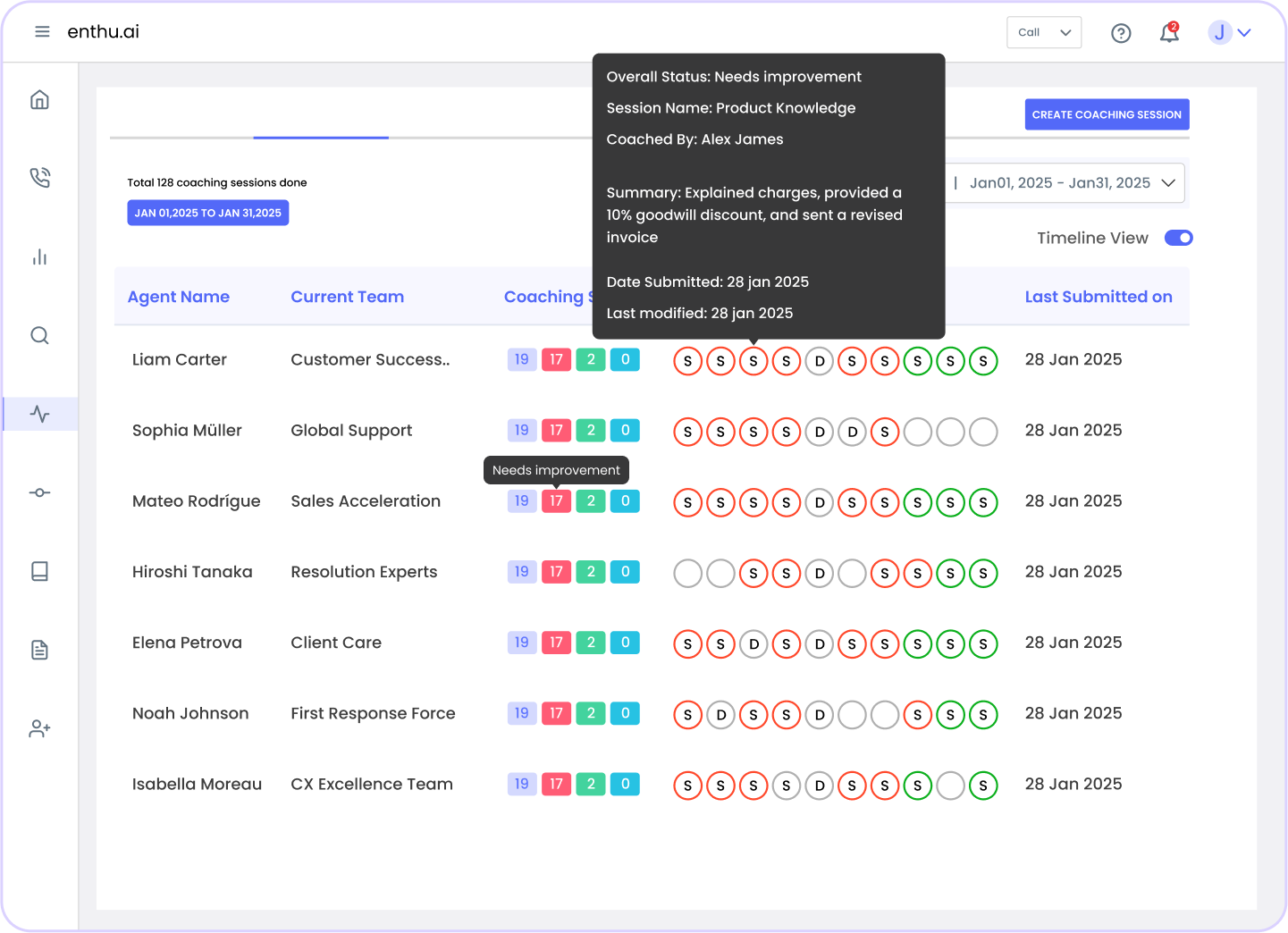
Pro tips to make your coaching session effective
Even with a solid plan, the real impact of coaching comes from how you deliver it.
Coaching isn’t about pointing out flaws – it’s about helping agents improve call by call, behavior by behavior. That requires focus, empathy, consistency… and a few smart shortcuts.
Here’s a breakdown of proven strategies to help you run high-impact sessions that drive real performance.
1. Let tech do the heavy lifting
The #1 killer of good coaching? Wasted time.
If you’re spending hours hunting for the right call to coach on or relying on random QA samples, you’re not only burning out, you’re missing critical teachable moments.
This is where Enthu helps.
Enthu automatically analyzes customer conversations and flags the ones that need attention.
It pulls up:
- Calls with missed greetings or compliance violations
- Escalations or supervisor requests
- Gaps in empathy, awkward silences, or long hold times
- Scorecard criteria agents didn’t meet
What this means for you:
You get a ready-made coaching queue every morning
No more digging through recordings or hoping the QA team caught it
You can coach faster, with more relevance, and at scale
You still lead the conversation, but Enthu puts the right calls and context at your fingertips.
That’s what modern coaching looks like.
2. Start with strengths before you dive into fixes
Don’t lead with what went wrong. Start by acknowledging what went right.
Even in a shaky call, there’s usually a moment worth praising – tone, pacing, patience, product clarity, etc.
Why this matters:
- It builds trust
- Lowers defensiveness
- Reinforces good habits already in motion
Example:
“Before we dig into the tricky part of that call, I want to say, your calm tone really stood out. You didn’t let the customer’s frustration rattle you. That’s a strength.”
Agents who feel seen for what they’re doing well are more open to feedback on what needs work.
3. Make it about the next call – not just the last one
It’s easy to get stuck replaying what went wrong.
But effective coaching is future-facing.
Once you’ve reviewed the issue, pivot to:
“What could we try next time?”
“How might you handle that same situation tomorrow?”
“Want to roleplay a stronger version of that part?”
The goal is to turn learning into action — not just analysis.
4. Embrace silence – let the agent reflect
Ask a question… then pause.
Agents often need a few seconds to process, especially if they’re unsure or caught off guard.
Example:
“What do you think went off-track on that call?”
(Then wait — 5 to 10 seconds)
Don’t rush to fill the gap. That space gives them time to reflect and respond honestly. That’s where learning begins.
5. Roleplay the tough spots
Yes, roleplay can feel awkward – but it’s one of the most effective coaching tools.
It helps agents:
- Hear themselves in real time
- Practice better phrasing
- Build muscle memory for tricky moments
How to do it:
Pick one 30 – 60 second snippet of the call
Replay it with roles reversed – or have them try again
Offer feedback on flow, tone, or wording
Example:
“Let’s try that refund objection again. I’ll be the customer. Just respond how you would now.”
It’s not about perfection – it’s about repetition and confidence.
6. Document it in real time
Summarizing the session out loud and in writing helps:
- Cement the main takeaway
- Create shared accountability
- Give the agent something to work from
What to log:
- The focus of the session (e.g., objection handling)
- What went well and what to improve
- The specific next step (e.g., pause before rebuttals)
- When you’ll follow up
Pro tip: Let them watch you write it down.
“I’m just noting this – ‘Focus on pausing before answering escalations. Will review on Friday.’ Cool?”
This feels collaborative – not controlling.
7. End with encouragement, not a checklist
Agents need to leave the session feeling capable – not just corrected.
Even if the call was rough, end with something positive:
- Progress made
- Attitude during tough moments
- Their willingness to learn
Example:
“You’re clearly thinking about this stuff and asking great questions. That tells me you care about getting better.”
A strong close builds morale. And agents who feel supported stick around and perform better.
8. Coach regularly, not just when something breaks
If coaching only happens after mistakes, agents start to dread it.
Make it part of the culture. Show up with the same energy when things go right:
“Let’s unpack what made that call so smooth.”
“Your QA score jumped this week. Want to talk about what changed?”
When coaching becomes routine, reactive agents engage.
They start bringing you questions. And they begin to see coaching as a tool, not a consequence.
F. 15 questions for leading a great coaching session
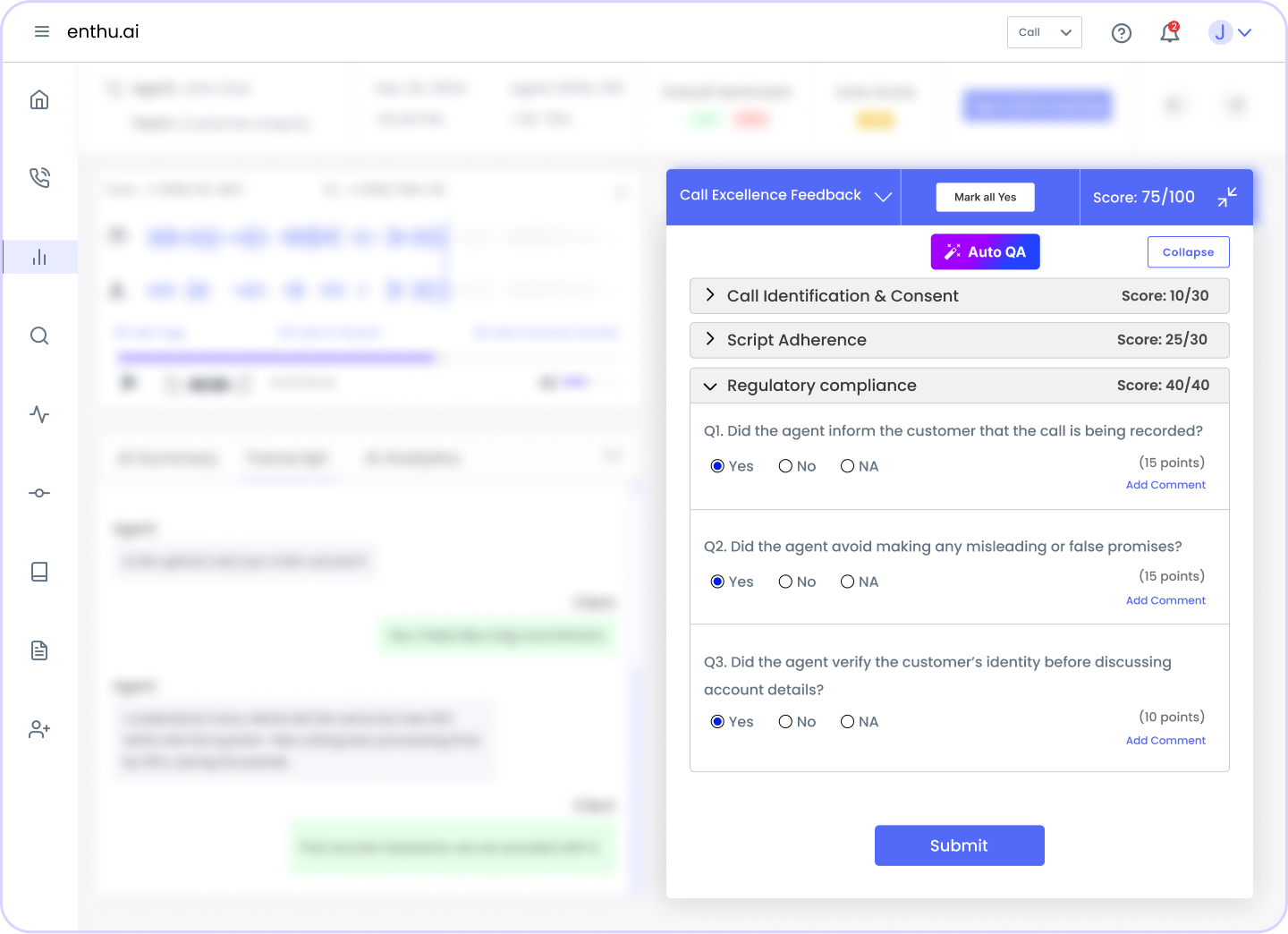
- What specific goals or outcomes would you like to achieve during today’s session?
- Can you provide an update on your progress since our last session?
- What challenges or obstacles have you encountered since our last session?
- How have you been applying the strategies or techniques we discussed previously?
- What successes or achievements have you experienced recently?
- Is there a specific area of focus or exploration you desire for today’s session?
- What inherent capabilities or assets do you possess to surmount your present obstacles?
- What assistance or direction do you seek from me to facilitate your advancement?
- Can you detect any recurrent motifs or trends within your cogitations, emotions, or conduct that could impact your advancement?
- What is your conception of the optimal result for this circumstance or hurdle?
- What measures or deeds do you reckon are requisite to realize your coveted outcome?
- Do you recognize any convictions or presumptions that might be impeding your progress?
- How can you amalgamate insights gleaned from past encounters into your existing scenario?
- What additional resources or support systems can you tap into to support your progress?
- How will you know when you’ve successfully addressed this challenge or achieved your goal?
G. Coaching session template
Now that you understand why each part of a coaching session matters, you’re ready to apply it. Here is a simple and free template that you can print out and use right away.
- Warm up: Ask agents what’s on their minds.
- Goal setting: Ask agents what they want to achieve?
- Core of coaching session: Provide agents techniques and strategies to solve challenges and achieve goals
- Commitments: Discuss concrete steps your agent can take to achieve their goals.
- Reflection: Schedule time for yourself after getting done with each sessions.
- Notes: Summarize in your notes what you and your agent discussed.
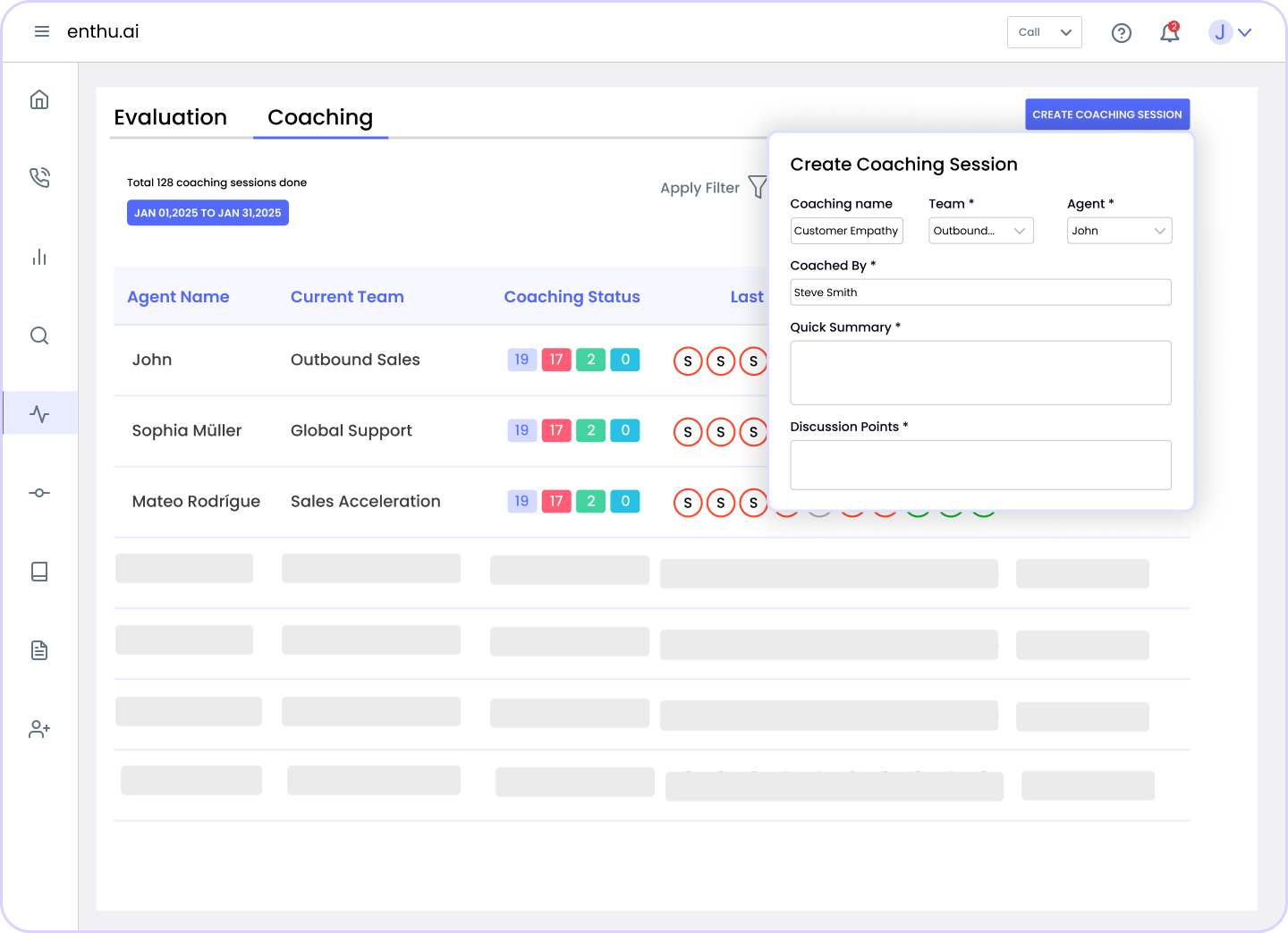
Conclusion
Running a coaching session is indeed about asking the right questions and creating a space for your agents to express themselves.
By incorporating the tips and templates provided, you can effectively guide your agents toward their goals and enhance their coaching experience.
Remember to adapt and evolve your coaching style over time, always striving to better support your agents in their journey of growth and development.
With these simple yet powerful strategies, you can make a meaningful impact on the lives of those you coach.
FAQs
1. What are the 5 basic elements of a coaching session?
The five basic elements of a coaching session are rapport-building, goal-setting, exploration and discussion, action planning, and accountability. These elements provide a framework for productive and impactful coaching interactions.
2. How to effectively conduct one-on-one coaching sessions?
To effectively conduct one-on-one coaching sessions, focus on active listening, asking powerful questions, providing constructive feedback, and fostering accountability. Tailor your approach to meet the unique needs and goals of each client, creating a supportive and empowering environment for their growth.
How to structure a coaching session?
Structuring a coaching session involves starting with rapport-building activities, reviewing progress since the last session, setting clear goals for the session, engaging in meaningful exploration and discussion, developing actionable steps, and closing with reflection and accountability. This structured approach ensures a focused and productive exchange between coach and client, maximizing the impact of the coaching session.
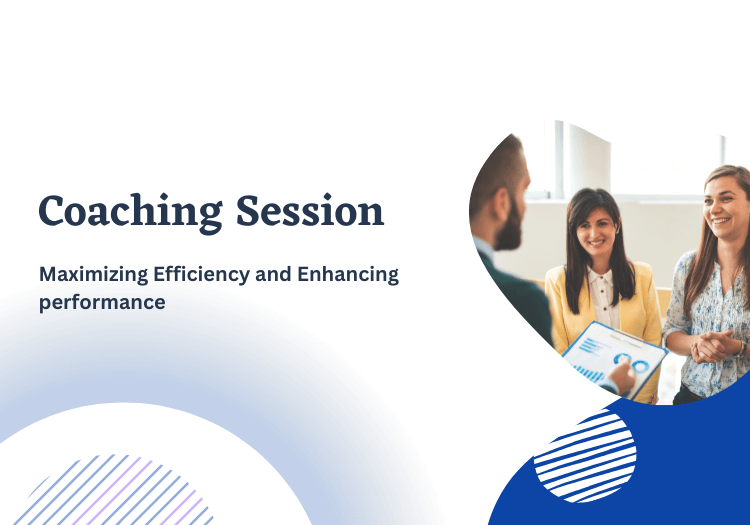


 On this page
On this page

